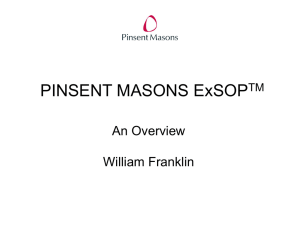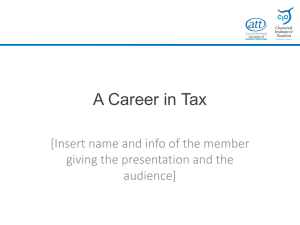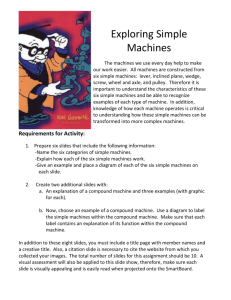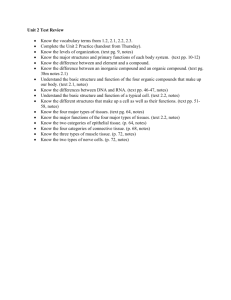Compound Interest
advertisement
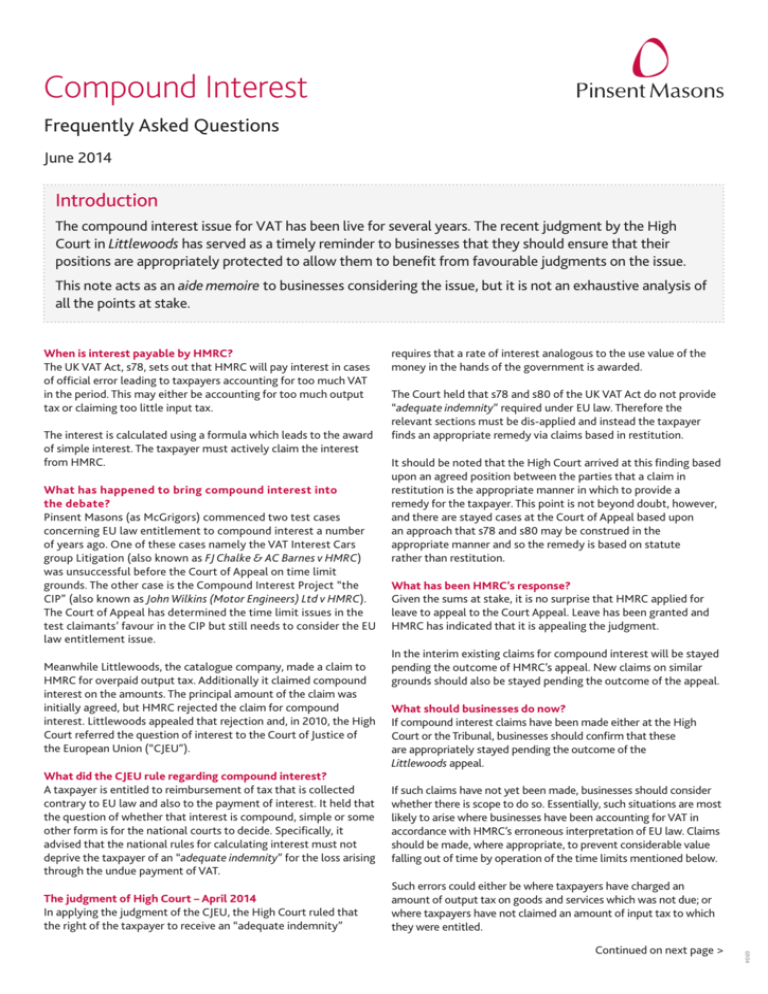
Compound Interest Frequently Asked Questions June 2014 Introduction The compound interest issue for VAT has been live for several years. The recent judgment by the High Court in Littlewoods has served as a timely reminder to businesses that they should ensure that their positions are appropriately protected to allow them to benefit from favourable judgments on the issue. This note acts as an aide memoire to businesses considering the issue, but it is not an exhaustive analysis of all the points at stake. When is interest payable by HMRC? The UK VAT Act, s78, sets out that HMRC will pay interest in cases of official error leading to taxpayers accounting for too much VAT in the period. This may either be accounting for too much output tax or claiming too little input tax. The interest is calculated using a formula which leads to the award of simple interest. The taxpayer must actively claim the interest from HMRC. What has happened to bring compound interest into the debate? Pinsent Masons (as McGrigors) commenced two test cases concerning EU law entitlement to compound interest a number of years ago. One of these cases namely the VAT Interest Cars group Litigation (also known as FJ Chalke & AC Barnes v HMRC) was unsuccessful before the Court of Appeal on time limit grounds. The other case is the Compound Interest Project “the CIP” (also known as John Wilkins (Motor Engineers) Ltd v HMRC). The Court of Appeal has determined the time limit issues in the test claimants’ favour in the CIP but still needs to consider the EU law entitlement issue. Meanwhile Littlewoods, the catalogue company, made a claim to HMRC for overpaid output tax. Additionally it claimed compound interest on the amounts. The principal amount of the claim was initially agreed, but HMRC rejected the claim for compound interest. Littlewoods appealed that rejection and, in 2010, the High Court referred the question of interest to the Court of Justice of the European Union (“CJEU”). What did the CJEU rule regarding compound interest? A taxpayer is entitled to reimbursement of tax that is collected contrary to EU law and also to the payment of interest. It held that the question of whether that interest is compound, simple or some other form is for the national courts to decide. Specifically, it advised that the national rules for calculating interest must not deprive the taxpayer of an “adequate indemnity” for the loss arising through the undue payment of VAT. The judgment of High Court – April 2014 In applying the judgment of the CJEU, the High Court ruled that the right of the taxpayer to receive an “adequate indemnity” requires that a rate of interest analogous to the use value of the money in the hands of the government is awarded. The Court held that s78 and s80 of the UK VAT Act do not provide “adequate indemnity” required under EU law. Therefore the relevant sections must be dis-applied and instead the taxpayer finds an appropriate remedy via claims based in restitution. It should be noted that the High Court arrived at this finding based upon an agreed position between the parties that a claim in restitution is the appropriate manner in which to provide a remedy for the taxpayer. This point is not beyond doubt, however, and there are stayed cases at the Court of Appeal based upon an approach that s78 and s80 may be construed in the appropriate manner and so the remedy is based on statute rather than restitution. What has been HMRC’s response? Given the sums at stake, it is no surprise that HMRC applied for leave to appeal to the Court Appeal. Leave has been granted and HMRC has indicated that it is appealing the judgment. In the interim existing claims for compound interest will be stayed pending the outcome of HMRC’s appeal. New claims on similar grounds should also be stayed pending the outcome of the appeal. What should businesses do now? If compound interest claims have been made either at the High Court or the Tribunal, businesses should confirm that these are appropriately stayed pending the outcome of the Littlewoods appeal. If such claims have not yet been made, businesses should consider whether there is scope to do so. Essentially, such situations are most likely to arise where businesses have been accounting for VAT in accordance with HMRC’s erroneous interpretation of EU law. Claims should be made, where appropriate, to prevent considerable value falling out of time by operation of the time limits mentioned below. Such errors could either be where taxpayers have charged an amount of output tax on goods and services which was not due; or where taxpayers have not claimed an amount of input tax to which they were entitled. 6904 Continued on next page > Compound Interest Frequently Asked Questions June 2014 How are compound interest claims made? The Littlewoods judgment proceeded on the basis that claims in restitution via the High Court are the only appropriate manner in which to bring such a claim. However, as noted above, our view (and that of a number of other observers) is that it is possible to bring such claims on a statutory basis via the Tax Tribunal. To prevent having a claim fail on the basis that it is brought in the wrong forum, it would be prudent to make the claim both via the High Court and the Tribunal. Are there any time limits in which compound interest claims must be brought? High Court On the basis of this common ground in Littlewoods, the High Court looked at two types of restitutionary claim – namely “Woolwich restitution” and “mistake-based restitution”. HMRC argued that only a “Woolwich claim” should be allowed, and therefore any entitlement would be restricted to tax overpaid in the six years prior to the issuing of court proceedings. The Judge in Littlewoods rejected this approach however and ruled that mistakebased restitution claims could be made on any overpayment discovered, rather than made, within six years of discovery of the mistake. Such a ‘mistake’ would include a decision of the CJEU (formerly the ECJ) confirming that a taxpayer had overpaid VAT as a result of HMRC’s incorrect application of the law. This is positive for taxpayers who have made High Court claims within six years of the decision of the CJEU on which their repayment of VAT was based. Tax Tribunal Taxpayers should make a claim for compound interest to HMRC within three (increased to four with effect from 1 April 2009) years of the repayment of their VAT and then appeal HMRC’s rejection to the Tribunal within 30 days. What to do now? The Pinsent Masons Tax Team has extensive experience in identifying, submitting and managing such claims. To discuss your potential opportunity, contact one of the team members below: Darren Mellor-Clark Partner Litigation & Compliance, Tax London T: +44 (0)20 7054 2743 E: darren.mellor-clark@pinsentmasons.com Stuart Walsh Partner Litigation & Compliance, Tax London T: +44 (0)20 7054 2797 M: +44 (0)7872 808717 E: stuart.walsh@pinsentmasons.com Jake Landman Associate Litigation & Compliance, Tax London T: +44 (0)20 7054 2572 E: jake.landman@pinsentmasons.com This note does not constitute legal advice. Specific legal advice should be taken before acting on any of the topics covered. Pinsent Masons LLP is a limited liability partnership registered in England & Wales (registered number: OC333653) authorised and regulated by the Solicitors Regulation Authority and the appropriate regulatory body in the other jurisdictions in which it operates. The word ‘partner’, used in relation to the LLP, refers to a member of the LLP or an employee or consultant of the LLP or any affiliated firm of equivalent standing. A list of the members of the LLP, and of those non-members who are designated as partners, is displayed at the LLP’s registered office: 30 Crown Place, London EC2A 4ES, United Kingdom. We use ‘Pinsent Masons’ to refer to Pinsent Masons LLP, its subsidiaries and any affiliates which it or its partners operate as separate businesses for regulatory or other reasons. Reference to ‘Pinsent Masons’ is to Pinsent Masons LLP and/or one or more of those subsidiaries or affiliates as the context requires. © Pinsent Masons LLP 2014. 6904 For a full list of our locations around the globe please visit our website: www.pinsentmasons.com

